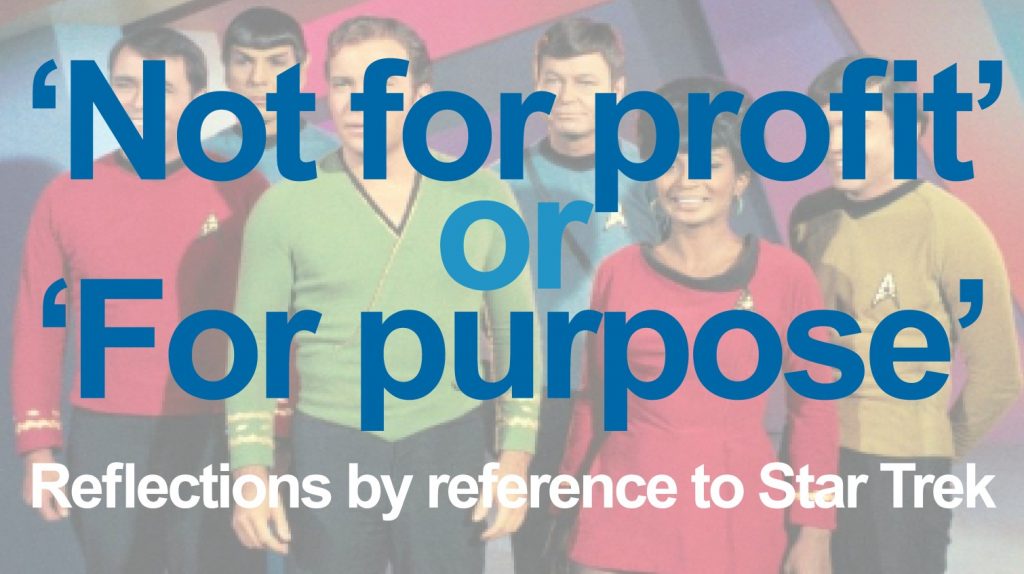‘Not for profit’ or ‘For purpose’: Some reflections
Sometimes we need to reinvent. I think one thing that might need some reinvention is the ways we describe sectors we care about – how we frame them. This is because words matter. They convey underlying assumptions. For too long we have used the term “not for profit” sector, which negatively frames it. Let’s face it – sometimes it is easy to get settled with what we know.
I want to explain this in a meandering way by offering a short diversion into science fiction on TV.
Growing up in the 1980s the reruns were what we watched after school – Hogan’s Heroes, I Dream of Genie and one of my favourites – Star Trek. In an era today of digital overload and a firehose of content on every device, this was a time of two channels only – TV3 only launched in November 1989. Yes, just two channels. A third channel was big news …

I really loved Star Trek because it was fun, had adventures and a surprising amount of humour. It was of its era in terms of hand painted scenery but you could stretch your imagination to overlook that. There were also attitudes of its time (although in the cold war, it had a Russian officer and had the first interacial kiss on television too). I’ve always been happy with it because it evokes a time from when I was a child. It’s iconic. Could it ever be improved? Change is bad… and yet … the reminder was there in that show that we need to ‘boldly go where no one has gone before’.

It was first broadcast in September 1966 and ran for three years and 79 episodes before it was cancelled.
I recently saw what Star Trek could really be in “Star Trek: Strange New Worlds” – it’s currently online for free on TVNZ+. This new show does what the original intended but seems to be a whole lot better – original ideas, movie quality effects and a tone that is quite different – that includes the captain having a kitchen in his room where he invites the crew, cooks for them and gets to know them. It has crew members sacrificing themselves to save others. Ethical dilemmas like a doctor who cannot save his daughter who is dying of cancer so keeps her permanently in a transporter beam buffer – raising interesting questions with a human lens. It builds on the original Star Trek but also has a very different vibe to the 1960s show.
Anyway, this got me thinking about a sector I care a lot about.

Just like the original Star Trek I’ve been happy with the term “Not for profit” and used it myself, because it is a label that is understood. But should we settle for that just because it’s what we’ve used in the past? Can we ask a few hard questions? Let’s break it down – why do we:
- Start the description with a negative word – “not” – we don’t describe other important things in our life by saying what they are not (“Are you enjoying that ‘Not coffee'”?);
- Frame it by reference to “for profit”? By doing so we adopt the paradigm of thinking that we centre what we do around whether or not we make profit – as if that is the more important thing;
- We miss out the heart of the sector which is that we often act for reasons that are far higher and more noble and worthy than “profit”.
Like the original Star Trek we could be content and think our terminology cannot change or be improved – but it can. Just like this show is better, we can change and improve too. What if we started consciously talking about the “For purpose” sector and labelling reports we are involved on with the term “For purpose sector report” instead?
It’s a simple step but I think this would focus us in on the fact that we are defined by what we are – rather than what we are not. Would you be willing to join this movement?
This would also allow us to get beyond the binary thinking of either you are a charity which is “Not for profit” (doing good) or you are a business “For profit” (focussed on shareholder returns). You can do both. And I don’t mean profit is bad – it is a measure of sustainability, and we need to have a new conception that it is possible to be both “for profit” and “for purpose”.
This phrasing of “For purpose” can encompass a far wider group than just charitable entities. So that is my challenge if you have read this far. Embrace new ways. Let’s start to ‘Boldly go where no one has gone before’ and really think deeply about the terms we use, and what they are really saying. Let’s start describing what we do as being part of the ‘for purpose’ sector.
That is all. Let me know what you think?
Note: If you want more on this, was recently on a panel at the Fundraising Institute of New Zealand conference and mentioned this topic and others as well, the audio is on seeds podcast as episode 322 here.





